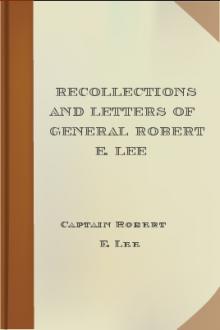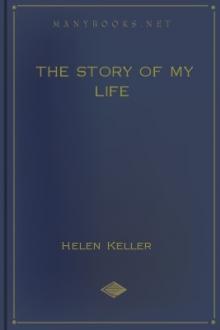Recollections and Letters of General Robert E. Lee by Captain Robert E. Lee (howl and other poems .txt) 📕

- Author: Captain Robert E. Lee
- Performer: -
Book online «Recollections and Letters of General Robert E. Lee by Captain Robert E. Lee (howl and other poems .txt) 📕». Author Captain Robert E. Lee
Remember me to Colonel Taylor, all his mother’s family, his wife, the Bakers, Seldens, etc. I know none of the latter but the Doctor, for whom I have always had a great esteem. Your mother, brother, and Mildred send their best love and kindest wishes. I am always, “Your devoted father, R. E. Lee.
“Miss Agnes Lee.”
It was at Dr. Seldon’s house that my sister was visiting. He had been very kind in offering assistance to my father and mother. I remember well the supper given me and several of my comrades when we were coming back from the surrender, and while the Doctor and his family were refugees at Liberty, now Bedford City, Va. Stopping there one night, weary and hungry, while looking for quarters for man and beast, I got a note asking me and my friends to come to their house. An invitation of that kind was never refused in those days. We went and were treated as if we had been sons of the house, the young ladies themselves waiting on us. In the morning, when we were about to start, they filled our haversacks with rations, and Mrs. Selden, taking me aside, offered me a handful of gold pieces saying that she had more and that she could not bear to think of my father’s son being without as long as she possessed any.
The love and devotion shown my father by all the people of the South was deeply appreciated by him. He longed to help them, but was almost powerless. I think he felt that something could be done in that direction by teaching and training their youth, and I am sure this idea greatly influenced him in deciding to accept the presidency of Washington College. The advantages to the South of a proper education of her youth were very evident to him. He strongly urged it wherever and whenever he could. In a letter written at this time to the Reverend G. W. Leyburn, he speaks very forcibly on the subject: “So greatly have those interests [educational] been disturbed at the South, and so much does its future condition depend upon the rising generation, that I consider the proper education of its youth one of the most important objects now to be attained, and one from which the greatest benefits may be expected. Nothing will compensate us for the depression of the standard of our moral and intellectual culture, and each State should take the most energetic measures to revive the schools and colleges, and, if possible, to increase the facilities for instruction, and to elevate the standard of learning….”
Again, in a letter to General John B. Gordon, written December, 1867, he says:
“The thorough education of all classes of the people is the most efficacious means, in my opinion, of promoting the prosperity of the South. The material interests of its citizens, as well as their moral and intellectual culture, depend upon its accomplishment. The text-books of our schools, therefore, should not only be clear, systematic, and scientific, but they should be acceptable to parents and pupils in order to enlist the minds of all in the subjects.”
In a letter to a friend in Baltimore he is equally earnest: “I agree with you fully as to the importance of a more practical course of instruction in our schools and colleges, which, calling forth the genius and energies of our people, will tend to develop the resources and promote the interests of the country.”
In many other letters at this time and later on, especially in one to Professor Minor, who had been appointed with him upon a board by the Educational Society of Virginia, did he urge the importance of education for the present and future safety, welfare, and prosperity of the country. Among the many tokens of respect and admiration, love, and sympathy which my father received from all over the world, there was one that touched him deeply. It was a “Translation of Homer’s Iliad by Philip Stanhope Worsley, Fellow of Corpus Christi College, Oxford, England,” which the talented young poet and author sent him, through the General’s nephew, Mr. Edward Lee Childe, of Paris, a special friend of Mr. Worsley. I copy the latter’s letter to Mr.
Childe, as it shows some of the motives influencing him in the dedication of his work:
“My Dear Friend: You will allow me in dedicating this work to you, to offer it at the same time as a poor yet not altogether unmeaning tribute of my reverence for your brave and illustrious uncle, General Lee. He is the hero, like Hector of the Iliad, of the most glorious cause for which men fight, and some of the grandest passages in the poem come to me with yet more affecting power when I remember his lofty character and undeserved misfortunes. The great names that your country has bequeathed from its four lurid years of national life as examples to mankind can never be forgotten, and among these none will be more honoured, while history endures, by all true hears, than that of your noble relative. I need not say more, for I know you must be aware how much I feel the honour of associating my work, however indirectly, with one whose goodness and genius are alike so admirable.
Accept this token of my deepest sympathy and regard, and believe me, “Ever most sincerely yours, “P. S. Worsley.”
On the fly-leaf of the volume he sent my father was written the following beautiful inscription:
“To General Lee,
The most stainless of living commanders
and, except in fortune, the greatest,
this volume is presented
with the writer’s earnest sympathy
and respectful admiration
‘… oios yap epveto Idiov Ektwp.’
Iliad VI—403,”
and just beneath, by the same hand, the following beautiful verses: “The grand old bard that never dies,
Receive him in our English tongue!
I send thee, but with weeping eyes,
The story that he sung.
“Thy Troy is fallen,—thy dear land
Is marred beneath the spoiler’s heel—
I cannot trust my trembling hand
To write the things I feel.
“Ah, realm of tears!—but let her bear
This blazon to the end of time:
No nation rose so white and fair,
None fell so pure of crime.
“The widow’s moan, the orphan’s wail,
Come round thee; but in truth be strong!
Eternal Right, though all else fail,
Can never be made Wrong.
“An Angel’s heart, an angel’s mouth,
Not Homer’s, could alone for me
Hymn well the great Confederate South—
Virginia first, and LEE.
“P. S. W.”
His letter of thanks, and the one which he wrote later, when he heard of the ill health of Mr. Worsley—both of which I give here—show very plainly how much he was pleased:
“Lexington, Virginia, February 10, 1866.
“Mr. P. S. Worsley.
“My Dear Sir: I have received the copy of your translation of the Iliad which you so kindly presented to me. Its perusal has been my evening’s recreation, and I have never more enjoyed the beauty and grandeur of the poem than as recited by you. The translation is as truthful as powerful, and faithfully represents the imagery and rhythm of the bold original. The undeserved compliment in prose and verse, on the first leaves of the volume, I received as your tribute to the merit of my countrymen, who struggled for constitutional government.
“With great respect,
“Your obedient servant, “R. E. Lee.”
“Lexington, Virginia, March 14, 1866.
“My Dear Mr. Worsley: In a letter just received from my nephew, Mr.
Childe, I regret to learn that, at his last accounts from you, you were greatly indisposed. So great is my interest in your welfare that I cannot refrain, even at the risk of intruding upon your sickroom, from expressing my sincere sympathy in your affliction. I trust, however, that ere this you have recovered and are again in perfect health. Like many of your tastes and pursuits, I fear you may confine yourself too closely to your reading. Less mental labour and more of the fresh air of Heaven might bring to you more comfort, and to your friends more enjoyment, even in the way in which you now delight them.
Should a visit to this distracted country promise you any recreation, I hope I need not assure you how happy I should be to see you at Lexington. I can give you a quiet room, and careful nursing, and a horse that would delight to carry you over our beautiful mountains.
I hope my letter informing you of the pleasure I derived from the perusal of your translation of the Iliad, in which I endeavoured to express my thanks for the great compliment you paid me in its dedication, has informed you of my high appreciation of the work.
“Wishing you every happiness in this world, and praying that eternal peace may be your portion in that to come, I am most truly, Your friend and servant,
“R. E. Lee.”
That winter, my father was accustomed to read aloud in the long evenings to my mother and sisters “The Grand Old Bard,” equally to his own and his listeners’ enjoyment.
Two or three years after this, Professor George Long, of England, a distinguished scholar, sent my father a copy of the second edition of his “Thoughts of the Emperor Marcus Aurelius.” The first edition of this translation was pirated by a Northern publisher, who dedicated the book back to Emerson. This made Long very indignant, and he immediately brought out a second edition with the following prefatory note:
“…I have never dedicated a book to any man and if I dedicated this, I should choose the man whose name seemed to me most worthy to be joined to that of the Roman soldier and philosopher. I might dedicate the book to the successful general who is now the President of the United States, with the hope that his integrity and justice will restore peace and happiness, so far as he can, to those unhappy States which have suffered so much from war and the unrelenting hostility of wicked men. But as the Roman poet says,
“‘Victrix causa deis placuit, sed victa Catoni;’
“And if I dedicated this little book to





Comments (0)